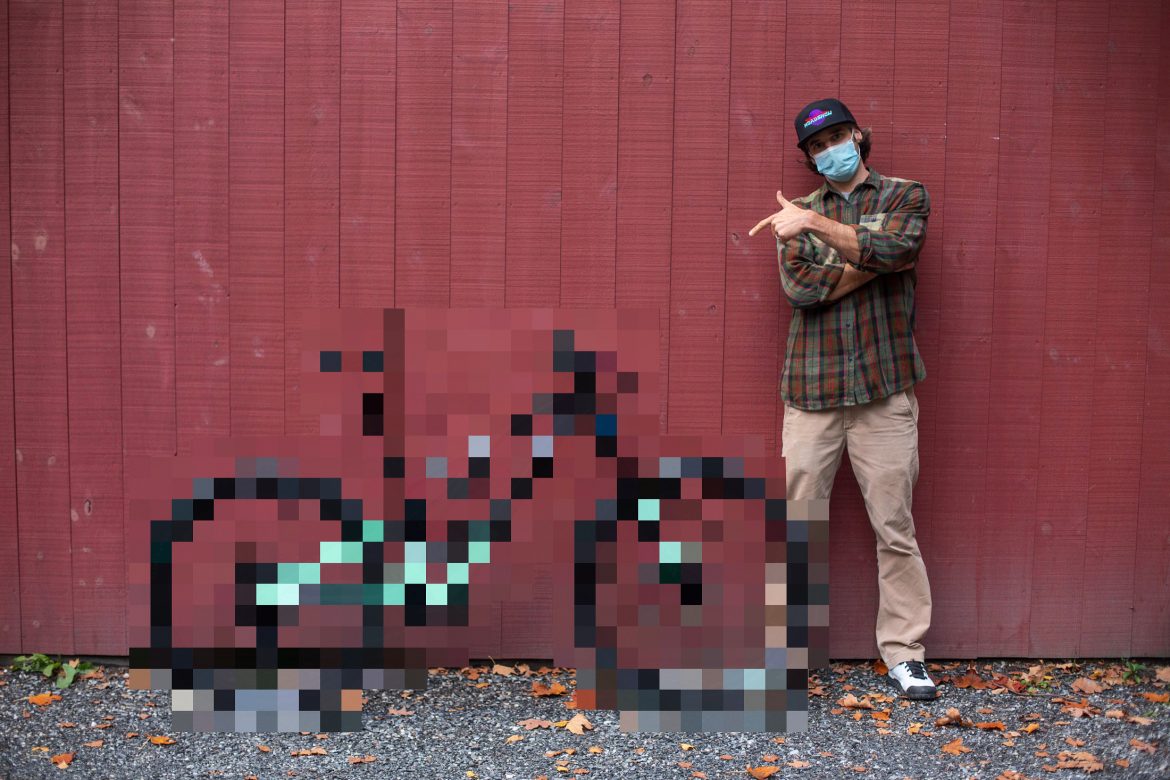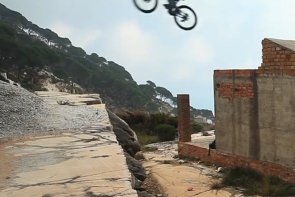Ask any bike shop owner their origin story and 99 times out of 100 it comes back to a simple love of bikes (riding them, studying them, and simply the bikes themselves). And we, the owners of Ranch Camp, are no different. While our story might be a bit more nuanced (Ranch Camp is also a restaurant), our motivations when opening the shop went above our collective addiction to bikes; then as now, our desire was to build community around shared interests, to take that stoke that comes from rallying laps with your pals, whether old or new, and turn it into “a thing.” It’s in our employee handbook as well as our business plan: we’re not in the bike business, we’re in the business of building relationships. And while it’s trite to say that we aspire to create something bigger than ourselves, it’s the truth.
We opened the shop in 2018 and since day one, Specialized has been woven into the fabric of Ranch Camp. Until recently, they stood out as one of the only major bikes brands to all but eschew any kind of direct-to-consumer sales channels. Quite the contrary, they doubled down on their commitment to brick and mortar.
During our first visit to Specialized’s mothership in Morgan Hill, CA, for their annual retailer event, we were literally greeted at the door by Mike Sinyard (Specialized’s founder and, until recently CEO ), and with a firm handshake and unbroken gaze he said to me, “thank you for supporting the Specialized brand. It’s all about you, the retailer.” Consider me a cool-aid drinker, I thought to myself. (on a subsequent visit I got to meet Loic Bruni but that’s a whole other story).
From the jump, our values as businesses were clearly in alignment (despite warnings of heavy handedness from other seasoned retailers). Specialized were always game for our half-cocked marketing schemes and approved requests for product to support fundraising initiatives without fail. Looking back on the past four years, we have a lot of really strong memories tied to the Specialized brand and the places their bikes took us and our business. For the customers who experienced the joy of purchasing their dream bike, or our own personal journeys aboard our Stumpies, Enduros, Fuses, Diverges, and Levos, those memories are permanently etched.
So when we got the call a few months back priming us for Specialized’s announcement to offer bikes direct-to-consumer, it was a bit of a gut punch. Ever the optimists, we strategized what opportunities may lie hidden in this move away from the Independent Bike Dealer [I.B.D.] and tried to discern ways to adapt to this move in some positive way. In speaking with other retailers, most lacked our optimism, but Specialized’s repeated mantra of this move being “mutually beneficial” came down from on high often enough to make us believe in our misguided aspirations to succeed where others would fail.
Over the span of the first few weeks following the announcement, we arranged multiple calls and Zooms to flesh out ways to capitalize on this “evolution.” Those conversations were naught more than a feel-good pep talk that only just delayed the inevitable.
All the while, the realists in us couldn’t ignore the feeling of infidelity that permeated Specialized’s D2C move – where we had once played a pivotal part in helping people find the perfect bike, suddenly our boots-on-the-ground role was being usurped in lieu of one-click efficiency. And where we once worked hand-in-glove as vendor and retailer in our shared mission to bring more riders into the fold, our shop (and many others) had been de-prioritized in order to boost specialized margins. We – Specialized and Ranch Camp – were no longer the symbiotic being we once had been. Instead each of us were in pursuit of the same resources at the expense of the other. “Mutually beneficial” had morphed into zero sum; in essence, we were in competition with an entity that had once been our closest ally.
There are two perspectives from which an event like this is inevitably viewed: the emotional, and the objective. From the emotional perspective, the direct-to-consumer move signaled a sea of change at Specialized, and perhaps the industry at large, and the purists among all of us view this evolution as a bit of an affront to the sanctity of the local bike shop. In an era where, by all measures, most bike manufacturers are enjoying some of the most fruitful times in history, it’s hard to understand why a company like Specialized would go back on their promise of supporting IBD’s like Ranch Camp in pursuit of even more profit and market share. But as unapologetic bike nerds, as fans of the brand, as tried and true believers in the product Specialized makes, the D2C announcement was a difficult pill to swallow.
Then there’s the objective side of it: while Specialized is not a publicly traded company beholden to shareholders, they still have quotas to meet, bills to pay, and likely a pile of debt to contend with in the aftermath of the past few years’ insatiable demand for more bikes. Providing a channel by which to bypass bike shops like ours means there’s simply more money to be made by Specialized. Facts are facts and business is business.
Slowly, objectivity began to overrule emotion: with Specialized routing more of their resources to online inventory and less to the IBD, the writing was on the wall. Bikes that we’d been waiting on for over a year – that customers had put deposits on – were now available for purchase online, yet still unavailable to bike shops. In the spirit of doing right by our customers, we made calls, refunded deposits, urged those customers to purchase the bike online and secure it before it was gone since we were not able to access those bikes. Amid tightening margins and rising shipping costs this approach was very costly to a small, relatively young business like ours, but felt like the right thing to do.
So here is the reality with which we were faced: our flagship retail partner had usurped our role in the bike buying process and the resultant arrangement simply did not position us to service our customers in a meaningful way, or a way that was concurrent with our standards. At this point I’m quite sure we were one of many shops that grappled with this same “should I stay or should I go?” dilemma. And as much as we’d love to say we made a decision confidently and decisively to set sail for calmer waters on the spot, it was just the opposite: we agonized, we analyzed, we debated.
Among myself and my two business partners, we each confessed to losing sleep over whether to sever ties or tough it out, if for no other reason than for the history of the relationship we had with the brand. Continually though, we returned to our north star(s): what’s best for our local and loyal customers, and what’s best for the cycling community at large? Trying to compete on a very un-level playing field was not the answer to either of those questions. And so, after much deliberation, it was our decision to part ways with the big S and all it stood for.
Let’s pause here for a clarification: this is not a wholesale indictment of direct to consumer sales channels. As bike shop owners would we rather see people buy local? Of course. But the reality is that D2C provides many consumers an opportunity where one might not otherwise exist. We’re not here to advocate for or against, but in the context of Specialized, they made it clear that their commitment to brick and mortar had come to an end and that the paradigm had shifted, which is a drastic departure from their previous stance. End digression.
When the smoke clears, our shop will be just fine, despite a lot of time and money having been dedicated to our move away from the brand. Maybe a little more gray around the temples, but none the worse for wear. And that’s because we will not capitulate to the demands of any vendor whose values do not align with ours, and ultimately do not align with the needs of the people we serve. We will do right by our customers come hell or high water, just like we always have. Is it the most profitable way to do business? Not even close. But we’ll sleep well at night. And along the way, hopefully we can continue to cultivate meaningful relationships with our other brands. Relationships that are sustainable, mutually beneficial, and allow us to help foster the proper culture in our cycling community.
Sadly though, there will be casualties in the wake of Specialized’s decision. Many shops, saddled with crushing debt after acquiring mountains of inventory in the wake of a near total bike blackout, have been or will be forced to close or sell. In some cases, selling to the very creditors to whom they’re indebted. Is this by design? That’s not for me to say but the commonality with which it’s occurring makes the conspiracy theorist in me think so. These divergent approaches to selling bikes are illustrative of the darker side of the Covid-induced bike boom.
And I’m quite sure Specialized will be fine as well. Regardless of anyone’s opinion, they do make some of the best bikes on the market and this move could ultimately prove a boon to the riding community at large who may now have greater / better access to those bikes. And it’s not all doom and gloom either: one of the upsides of the Specialized shakeup is the new relationships we’ve developed with other shop owners around the country – the opportunity to share strategies, tactics, fears, and aspirations with a complete stranger is yet another example the of the unique bond that results from this shared love of bikes.
My sense is that this move from Specialized is just the tip of the iceberg; the post-Covid demand for bikes and ability to record profits in the internet age will combine to undoubtedly shake the foundations on which many brick and mortar shops were built. But here comes the optimist in me again: I’m of the opinion that the bike industry will follow in the footsteps of the food industry: industrial, overprocessed food is ubiquitous and not going away anytime soon, but the farm-to-table movement is stronger than ever. Which is to say, we’ll likely see more of the big companies abandon the principles on which they built their brands in pursuit of higher profits, while the niche companies who have doubled down on brick and mortar will continue to thrive amid the small, burgeoning markets that have, to date, defined the Covid bike boom.
The decision to part ways with Specialized, while not made on emotion, was an emotional decision (if that makes sense). But we’ve come full circle: the inception of this journey was laced with the optimism of undiscovered opportunity, and now as we set sail anew, we find that same optimism permeating our daily operations. Perhaps it’s time we rethink some things and really figure out how we can align as an industry in the name of sustainable growth while preserving the best rider experience. I sincerely hope that other shops are able to navigate these changes, and that the brick and mortar casualties are minimized along the way.
So we’ve reached a crossroads: are the needs of a brick and mortar shop and those of some of the biggest companies in the world so at odds that forward progress is untenable? Are Specialized 2.0 and the Pon Holdings of the world going to define how we buy bikes in the future? Who’s to say. As the saying goes, we vote with our dollars, and that rings as true for us as shop owners as it does for any consumer.
I for one, will remain optimistic that the inevitable bifurcation between brick and mortar and D2C will yield new opportunities, that bike shop owners the world around will once more prove their scrappiness and on a micro-scale, holding firm to our belief in the power of the bicycle to build community and affect change. Regardless of anyone’s opinion, it’s undeniable that these are interesting times we live in. And regardless of how this all shakes out, we’ll still be at the trailhead waiting for you with a beer and a high five when you finish your ride, no matter what kind of bike you’re on.




